Terry Gilliam’s Brazil imagines a world in which bureaucracy has won. It is a terrifying vision of the future. Brazil is a place where forms and procedures are more important than people, and where a paperwork error is the fault of the victim, not the bureaucrat who made it. Sentiments such as creativity, individuality, morality and the sanctity of life have no meaning in such a world that embraces its own stagnation and irrationality as points of pride and marks of its success.
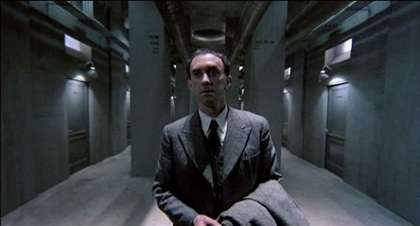
The film follows a young, low-level bureaucrat named Sam Lowry (played by the incomparable Jonathan Pryce) who is just trying to get by in life working a job that he finds sufficiently rewarding. All the while, society and his mother insist that he should try to advance higher in the system, because that is the proper measure of success (the fact that Lowry is perfectly happy where he is does not enter into consideration). Over the course of the film, Lowry dreams of a beautiful woman who he finally meets in life and who he struggles to help save from the bureaucratic system. While the story is well done and engaging, the most important part of Brazil is not the plot, but rather the horrific world that is occurs in.
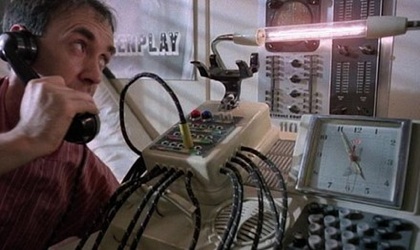
The unnamed society in Brazil (identified as being “Somewhere in the 20th Century”) shares many hallmarks with the confined, repressive world of Orwell’s Nineteen Eighty-Four. Both are run by monstrous, monolithic governments; both place little value on the life of the individual; and in both, a highly stratified social system exists that places the greatest luxury in the hands of the powerful. But whereas Orwell envisions a dystopian society built along the lines of mid-20th century totalitarianism, Brazil’s nightmare is one born from modern bureaucracy and consumerism. Pleasures are not denied outright, but rather they are restricted to those capable of affording them, which inevitably means people willing to undergo the process of rising high in the bureaucratic-corporate system. Indeed, one could argue that the world of Brazil is a horrific pairing of Nineteen Eighty-Four and Aldous Huxley’s Brave New World, mixing the former’s dehumanizing structure with the latter’s use of pleasure rewards to help maintain docility among the populace.
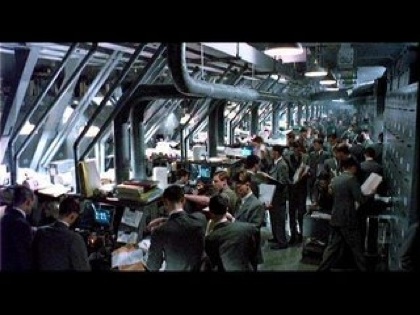
Brazil is like the theatre of the absurd. From an outside perspective none of it makes sense. An innocent man is arrested and presumably tortured and killed because a typographic error (the changing of a single letter on an arrest warrant) labeled him a dangerous terrorist. All attempts to appeal the mistake are shuffled around to other departments in a horrible bureaucratic shell game. Terrorists are dismissed as “bad sportsmen” and the bombings that wrack the city are covered up (physically with screens) as quickly as possible, not to deny their occurrence but to save the survivors from having to look at anything unpleasant. In order to save on the massive costs of running the monolithic Ministry of Information, criminals are billed for the process of arrest, imprisonment and torture that they undergo. But at the same time, society keeps running, and “good citizens” (i.e., people who have not run afoul of the fickleness of bureaucracy) have all the everyday home comforts they could want. So what if the government in Brazil will gladly kill an innocent man just because someone put his name on the wrong form? After all, we have television and fancy restaurants.
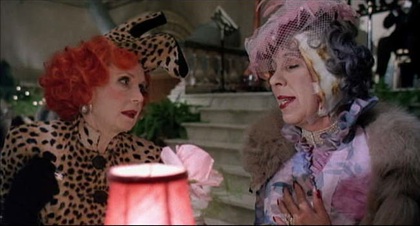
What makes Brazil so terrifying (arguably the most terrifying dystopian film ever made) is that it strikes so close to home. The world of Brazil is the logical progression of our own society’s worst and most absurd features. When we watch the film we can see facets of modern bureaucratic, consumerist life shining through, reminding us that as much as we cling to office life, paperwork, reasonable order and polite society to save us from chaos and discomfort, they become the same pit of irrationality that we desperately hope to escape.
G. D. Falksen is terrified of bureaucracy winning the war against creativity and he encourages all of you to go out and do your bit to fight the rising tide of paperwork that threatens to drown us all in absurdity.










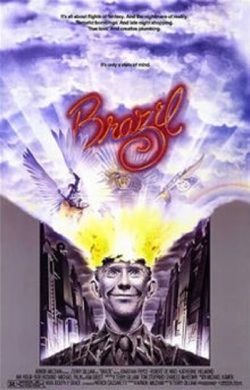
When I was younger these type of movies/stories seemed silly to me but now as I have turned forty and I am now paying attention to the politics of the world these type of movies/stories terrify me.
Excellent summary and description, GD. Your opening line places it in a nutshell. One of the best parts of the movie: the peripheral details, like the posters and slogans adoring the walls.
Don’t suspect your friends. Report them!
What a great movie. This is definitely one of those movies that earns you odd looks when you mention it as one of your favorites.
You forgot to mention it’s funny as well! (Or is that just me?)
The mad rescue and eventual fate of Sam really struck a chord in me. Utterly horrific, but yet utterly true to itself.
(And, very, very good.)
May none of us erroneously get put on a “Don’t Fly” list, or have our address erroneously entered on the warrant for a narcotics bust.
Love, C.
You mean like Cory Maye?
http://reason.com/archives/2006/10/01/the-case-of-cory-maye
The first time I saw “Brazil”, my brain did not work right for a couple of days afterwards …
What’s truly frightening is that the film is even more relevent to now than it was over 20 years ago. It’ll never go out of style… and that should make one pause for thought.
I had to chew it over for two years before I decided to stop being mad at “Brazil” and start liking it. Now, I haven’t yet watched it again… But it has stuck with me.
A crueler, more thoughtful cousin of “City of Lost Children”, perhaps. The absurdism in the two seems resonant with each other.
@@@@@ carandol
No, its not just you, the movie is very funny. Its mainly a very dark satire IMO. I’d be afraid of the world if it wasn’t so bloody rediculous.
Brazil and Network are probably the two films that depress me the most, as they are proving to be utterly prophetic, despite being satire.
One of the things that struck me was the visual nod to the distopia thinly hidden by the everyday commonplace artifacts. Such as when a clean white wall panel is removed and the rotting electro-mechanical guts spill out. That touches on something I see in our world – we are willing to overlook so much ugliness as long as we don’t have to see it.
On another note. I always find myself linking this film to the less absurd though still far from utopic Hudsucker Proxy. (Almost)Everyone at the Hud acting happy in their positions until they catch sight of a Blue Letter. Talk about bureaucratic stranglehold. A simple communication between two big-wigs in offices across the hall from each other that cannot be simply passed but rather is placed in the most frightning shell then sent down through the bottom most level of the corporation than back to the top – leaving a trail of fear and panic in its wake.
I have loved this movie since I was a child and it has affected how I look at the world. Sadly, this movie looks to be coming true.
One thought that keeps recurring, is that this film probably owes quite a lot to Candide ou L’Optimisme, with Sam Lowry as Candide, and his lady love playing the alternating parts of Cunegonde and Pangloss.
Except of course, Candide does end reasonably positively – he does marry Cunegonde in the end, though she is by then a dried-up middle-aged harridan – though he is still the same old simple-minded twit he ever was.
A good essay. The film has the malign atmosphere of Franz Kafka’s The Trial.
this summary is the best one i have read so far, it describes everything from the movie, but can you add the part where Sam looks at his mom but imagines jill instead of her, cause i dont really get what they signify by showing Jill as Sam’s mom.